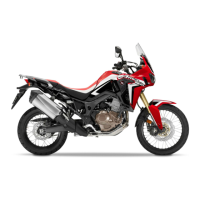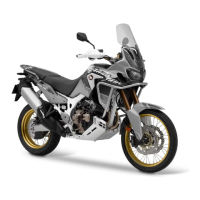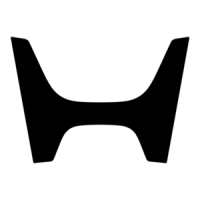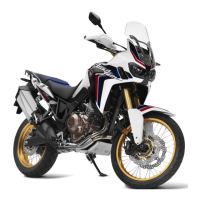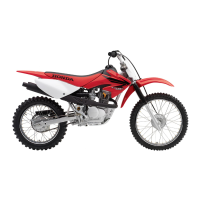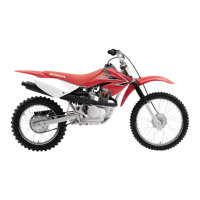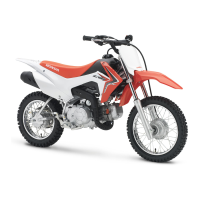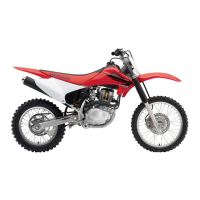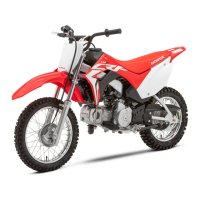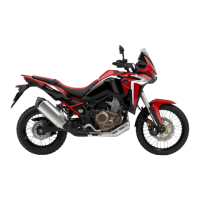Do you have a question about the Honda CRF1000L and is the answer not in the manual?
Guidelines to enhance rider safety.
Explanation of various safety labels and their meanings.
Precautions for safe riding and protective apparel.
Guidelines for safe riding practices and conditions.
Advice on adding accessories and modifications.
Specific safety advice for off-road riding.
Guidelines for proper loading and weight limits.
Identification of motorcycle parts and their locations.
Explanation of dashboard instruments and displays.
Location and function of various motorcycle switches.
Operation and features of the handle grip heater.
Explanation of different riding modes and their parameters.
How to select and use torque control levels.
Procedure for starting the motorcycle engine.
How to shift gears and transmission modes.
Explanation of DCT operating modes and functions.
How the emergency stop signal system operates.
Instructions for refueling and fuel guidelines.
Information on using the motorcycle's accessory socket.
Details about helmet holder, tool kit, etc.
Reasons why motorcycle maintenance is crucial.
Schedule of recommended maintenance tasks and intervals.
Basic principles and procedures for motorcycle maintenance.
List of tools required for maintenance.
Procedures for removing and installing body parts.
How to check, add, and change engine oil.
Checking and maintaining brake fluid and pads.
Checking the operation and safety features of the side stand.
Inspecting and adjusting the drive chain slack and wear.
Inspecting wheel rims and spokes for damage and tension.
Checking and adjusting clutch lever freeplay.
Checking the throttle operation for smoothness.
Cleaning the crankcase breather system.
Adjusting headlight aim, brake lever, and suspension.
Steps to resolve engine starting issues related to HISS.
Diagnosing and resolving engine overheating issues.
Explains warning lights like oil pressure, PGM-FI, ABS.
Procedures for dealing with tyre punctures and wheel removal.
Troubleshoots blinking gear position indicator in DCT.
Explains fuel gauge and coolant temp gauge failure indications.
Addresses issues like dead battery, burned bulbs, and blown fuses.
Information about ignition keys and key tags.
Overview of controls, instruments, and unique features.
Guidelines for washing and maintaining the motorcycle's appearance.
Procedures for storing the motorcycle for extended periods.
Safe methods for transporting the motorcycle.
Location and use of the owner's manual storage bag.
Information on environmental responsibility and cleaning.
Location and importance of frame and engine serial numbers.
Guidelines on using fuels with alcohol content.
Information about the catalytic converter and its protection.
Table listing main dimensions and weights of the motorcycle.
Technical data on gear ratios and reduction ratios.
Data on tyre sizes, pressures, and recommended tyres.
Specifications for spark plugs and idle speed.
Torque values for various motorcycle components.
| Bore x Stroke | 92.0 mm x 75.1 mm |
|---|---|
| Compression Ratio | 10.0:1 |
| Fuel System | PGM-FI electronic fuel injection |
| Transmission | 6-speed manual / 6-speed DCT |
| Final Drive | Chain |
| Front Tire | 90/90-21 |
| Rear Tire | 150/70-18 |
| Ground Clearance | 250 mm |
| Engine Type | Liquid-cooled, 4-stroke, parallel twin |
| Ignition | Full-transistorized type |
| Front Suspension | 45mm inverted telescopic fork with hydraulic damping adjustment |
| Rear Suspension | Pro-Link with hydraulic spring preload adjustment |
| Front Brakes | Dual 310 mm wave disc with radial fit 4-piston calipers |
| Rear Brakes | 256mm single wave hydraulic disc with single-piston caliper |
| Wheelbase | 1575 mm |
| Seat Height | 870 mm |
| Max Power Output | 70 kW (95 PS) @ 7, 500 rpm |
| Max Torque | 98 Nm @ 6, 000 rpm |
| Curb Weight | 518 pounds (Manual) / 534 pounds (DCT) |
